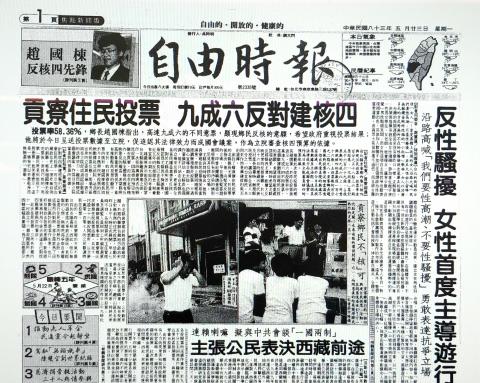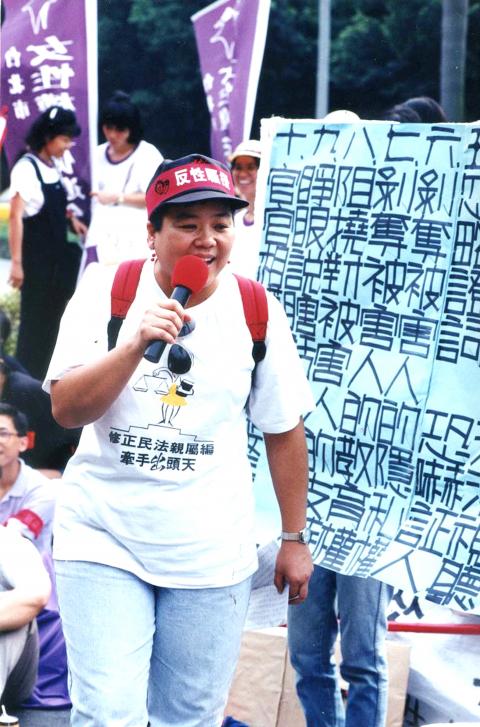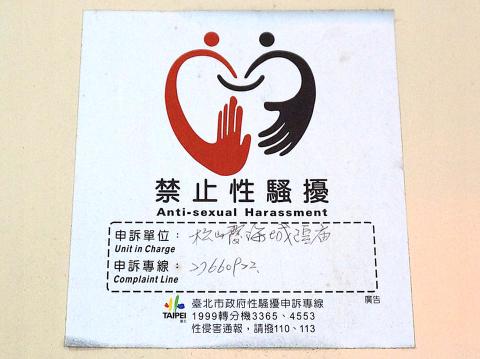May 20 to May 26
At the count of three, hundreds of fed-up women let out a collective scream that pierced the air for three full minutes. They stood where serial killer Chang Cheng-yi (張正義) in 1988 had robbed, raped and dumped the body of one of his six victims.
It was a time when women in Taiwan had just began to speak out against sexual harassment and sexual assault, with incident after incident coming to light until they finally took to the streets on May 22, 1994 to express their frustration.

Photo courtesy of Josephine Ho’s Discourse Database
Noted feminist academic and activist Josephine Ho (何春蕤) was the one who came up with the march’s slogan: “We don’t want sexual harassment, we want orgasms. If you keep sexually harassing us, we’ll cut it off with a pair of scissors!”
Curiously, almost all media outlets only recorded the first half of the slogan, omitting the threat of genital dismemberment. This included the Liberty Times (Taipei Times’ sister newspaper) who partially printed Ho’s words on its front page the next day.
“I didn’t want women to have to sexually repress themselves just because they feared sexual harassment,” Ho says in an interview posted on her Web site. But it seems like her ideas of women embracing, exploring and taking control of their own sexuality were too progressive even for women’s rights groups at that time, as she says that many activists kept a distance from her afterward.

Photo courtesy of Josephine Ho’s Discourse Database
EXPOSING THE WOLVES
In the 1980s, “sexual harassment” was not a common term in Taiwan. According to the National Museum of Taiwan History’s “Women of Taiwan” Web site, “the term was met with suspicion and distrust” when people first started using it. “Victims could only weep in silence until the first person was willing to stand out and take action.”
This first person was Lo Yu-e (羅玉娥), who in 1989 sued her manager for inappropriate language and behavior. There were no sexual harassment laws back then, and the manager was acquitted.

Photo courtesy of Josephine Ho’s Discourse Database
In the spring of 1990, a female teaching assistant was raped in Tsinghua University’s (清華大學) cafeteria. Around the same time, a male student was caught fondling a sleeping student’s breasts in the school library, leading to the revelation that he had done it to numerous women who never spoke out. The distraught students formed the “Little Red Riding Hood” movement, putting up posters around campus and publishing in 1993 a detailed handbook on how to deal with sexual harassment.
Detractors responded by spray painting “sexual harassment is not a crime” as well as derogatory messages around campus, and the commotion garnered the attention of other schools, sparking discussion on the treatment of women and body autonomy across the nation.
Several high-profile sexual harassment or sexual assault incidents made the headlines in the ensuing years, most of them perpetrated by male teachers or workplace superiors. The tipping point came on March 16, 1994, when a female student was caught spray painting the walls at National Taiwan Normal University, with messages warning students about a professor had who allegedly raped her a year before. Two weeks before that revelation, a National Taiwan University student was raped in her dorm room. And two weeks later, the Central Daily News reported on a National Chung Cheng University professor sexually harassing female students.

Photo courtesy of Wikimedia Commons
According to a United Daily News (聯合報) report, one female student even recanted her testimony after the offending professor threatened to send gangsters after her. The protestors accused the Ministry of Education and the schools of standing on the perpetrators’ side, listing all the inappropriate or callous comments they received from officials.
About 1,000 people belonging to 42 different organizations took to the streets. They screamed, they sang, they acted, they mourned and recounted the many instances of sexual harassment and assault. Other slogans included “Return my safety, return my freedom” and “Eliminate the wolves [sexual predators] and kill the pigs [chauvinists].”
They presented eight demands to the government, including proper punishment for the offending university staff; the enactment of sexual harassment laws and the establishment of gender equity committees on campuses; the introduction of gender equity classes in schools; make rape an indictable crime; and passing of an act for gender equality in employment.
MEDIA COVERAGE
The Liberty Times provided the most prominent coverage on the march out of the major newspapers, supplementing the front page article with more details under a then-ongoing series titled “How to Push Forward Social Change in Taiwan” (如何推動台灣社會改革).
The paper noted that this was the first mass protest that was almost exclusively organized and directed by women, praising their efforts and stating, “their numbers are not as strong as the usual political protests, but their morale is just as high.”
The report also noted that Japan Broadcasting Corp (NHK) sent a crew to report on the march, noting that “although social movements have showed signs of waning, the women’s rights movement seems to be as strong as ever.”
The United Daily News included a short article on the few men who participated, and also addressed the issue through a thoughtful letter to the editor. The author argued that while there are plenty of misogynists and chauvinists, there are also men who feel troubled because they aren’t sure how to treat women in a way that doesn’t constitute sexual harassment. Women were not encouraged to speak up before, and as they learn to do so, men need to listen carefully and not leave women as the only ones fighting for equality. The best way, the author suggested, is to actively participate in women’s rights activities so they get to spend more time with women as comrades, leading to a clearer notion of how to interact with females as equals.
What would become today’s Gender Equality Committee of the Executive Yuan was established in 1997, and the Act of Gender Equality in Employment was passed in 2002. It would take until 2005 for the government to enact the Sexual Harassment Prevention Act.
However, there is still work that needs to be done. Last year there were 671 reported cases of teachers sexually harassing or assaulting students, though that figure is almost certainly higher. Schools continue to protect the offending teachers, a recent example being a Neihu Vocational High School teacher who was allowed to finish his contract despite the law stipulating that he be fired. It took a second set of allegations for him to get the axe.
While the current situation still isn’t ideal, it was the courage and hard work of these early activists that forced the public to at least acknowledge the problem.
As the history museum article concludes, “The Little Red Riding Hoods succeeded in convincing society that the Big Bad Wolf really does exist.”
Taiwan in Time, a column about Taiwan’s history that is published every Sunday, spotlights important or interesting events around the nation that have anniversaries this week.

Towering high above Taiwan’s capital city at 508 meters, Taipei 101 dominates the skyline. The earthquake-proof skyscraper of steel and glass has captured the imagination of professional rock climber Alex Honnold for more than a decade. Tomorrow morning, he will climb it in his signature free solo style — without ropes or protective equipment. And Netflix will broadcast it — live. The event’s announcement has drawn both excitement and trepidation, as well as some concerns over the ethical implications of attempting such a high-risk endeavor on live broadcast. Many have questioned Honnold’s desire to continues his free-solo climbs now that he’s a

As Taiwan’s second most populous city, Taichung looms large in the electoral map. Taiwanese political commentators describe it — along with neighboring Changhua County — as Taiwan’s “swing states” (搖擺州), which is a curious direct borrowing from American election terminology. In the early post-Martial Law era, Taichung was referred to as a “desert of democracy” because while the Democratic Progressive Party (DPP) was winning elections in the north and south, Taichung remained staunchly loyal to the Chinese Nationalist Party (KMT). That changed over time, but in both Changhua and Taichung, the DPP still suffers from a “one-term curse,” with the

Jan. 26 to Feb. 1 Nearly 90 years after it was last recorded, the Basay language was taught in a classroom for the first time in September last year. Over the following three months, students learned its sounds along with the customs and folktales of the Ketagalan people, who once spoke it across northern Taiwan. Although each Ketagalan settlement had its own language, Basay functioned as a common trade language. By the late 19th century, it had largely fallen out of daily use as speakers shifted to Hoklo (commonly known as Taiwanese), surviving only in fragments remembered by the elderly. In

Lines between cop and criminal get murky in Joe Carnahan’s The Rip, a crime thriller set across one foggy Miami night, starring Matt Damon and Ben Affleck. Damon and Affleck, of course, are so closely associated with Boston — most recently they produced the 2024 heist movie The Instigators there — that a detour to South Florida puts them, a little awkwardly, in an entirely different movie landscape. This is Miami Vice territory or Elmore Leonard Land, not Southie or The Town. In The Rip, they play Miami narcotics officers who come upon a cartel stash house that Lt. Dane Dumars (Damon)